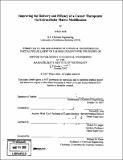Improving the delivery and efficacy of a cancer therapeutic via extracellular matrix modification
Author(s)
Mok, Wilson
DownloadFull printable version (29.23Mb)
Other Contributors
Massachusetts Institute of Technology. Dept. of Chemical Engineering.
Advisor
Rakesh K. Jain and Robert S. Langer.
Terms of use
Metadata
Show full item recordAbstract
The extracellular matrix (ECM) has been shown to be a significant source of hindrance to the transport of macromolecules in solid tumors. This thesis shows that by limiting their interstitial transport, the tumor ECM can reduce the efficacy of cancer therapeutics. Furthermore, techniques for overcoming this transport barrier and improving the effectiveness of existing cancer therapetuics are developed. Mathematical modeling was utilized to characterize the distribution of a therapeutic herpes simplex virus (HSV) vector in solid tumors. The model showed that the spread of virus following intratumoral injection is severely limited by rapid binding and limited diffusion. Importantly, the model demonstrates that an improvement in virus diffusion can enhance its distribution significantly. In vivo multiphoton imaging of fibrillar collagen type I and injected HSV vectors largely supported the model predictions. Injected viral particles could not penetrate dense networks of fibrillar collagen. Both the initial distribution and subsequent propagation of these replication-competent vectors were limited by collagen. Degradation of tumor collagen with bacterial collagenase enhanced the distribution and efficacy of the virus. To develop a technique that is clinically applicable, human collagenases were screened for similar activity. Matrix metalloproteinase (MMP) -1 and -8 were identified as viable candidates and tested for their ability to degrade collagen and enhance diffusion in tumors. When overexpressed in tumors, neither MMP significantly altered collagen content or diffusive transport. However, these MMPs have multiple matrix substrates and were found to deplete the tumor of sulfated glycosaminoglycans (GAGs). This, in turn, increased the hydraulic conductivity of these tumors, enhancing the distribution and efficacy of infused oncolytic HSV. Genetic mutations were employed to enhance the activity of these enzymes, but impaired intracellular processing and inactivating autoproteolytic degradation reduced overall activity. (cont.) Thus, our work demonstrates the importance of the tumor extracellular matrix in regulating the distribution and efficacy of cancer therapeutics. Methods to modulate both tumor collagen and sulfated GAGs are developed to enhance interstitial transport and improve the treatment of solid tumors.
Description
Thesis (Ph. D.)--Massachusetts Institute of Technology, Dept. of Chemical Engineering, February 2008. Includes bibliographical references.
Date issued
2008Department
Massachusetts Institute of Technology. Department of Chemical EngineeringPublisher
Massachusetts Institute of Technology
Keywords
Chemical Engineering.